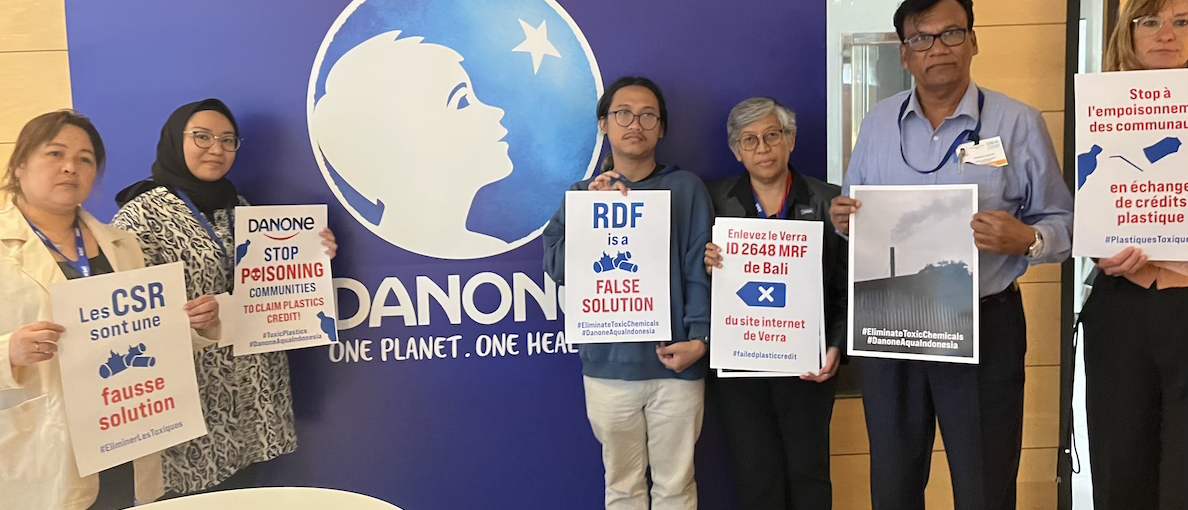Update from the Financial Times, April 26, 2024: Danone’s plastic credits project suspended following community complaints.
Danone project claims “plastic credits” for toxic facility that threatens local air and water
PARIS—This week in Paris, while more than 2800 delegates from 178 countries are negotiating the Plastics Treaty to tackle the global pressing issue of toxic health threats from plastic, members of the Angga Swara neighborhood in Jimbaran, Bali, Indonesia are calling on the major international food company Danone to stop using their community as a toxic plastic dumping ground. The Angga Swara community of more than 500 residents suffer from toxic air and filthy smells from a Danone-Aqua Indonesia plastic and waste material recovery facility. The community has identified and documented irregularities by Danone’s partners in establishing the facility, including forging several community signatures to obtain the permit.
Danone-Aqua Indonesia is a subsidiary of Danone International, which is a co-founder of the corporate-led 3R initiative that offers “plastic credits,” a scheme similar to carbon credits for so-called plastic recovery projects. But over the last 20 months, the community has repeatedly complained about Danone’s Integrated Waste Processing Facility (Tempat Pengelolaan Sampah Terpadu, called TPST Samtaku Jimbaran) in Angga Swara Neighborhood for the foul odors coming from the plant. The community also raised concerns about Danone’s violations in the permitting process and for receiving plastic credits from Verra, a US nonprofit that the companies engaged for their plastics credit scheme, despite the failures of Verra’s carbon credits projects.
In their letter to Danone, the community states that they have identified “a total of 14 cases of non-compliance, inconsistencies and lack of accountability in [Danone’s] obtaining approval to build and operate [TPST Samtaku Jimbaran],” and calls on the company “to immediately and permanently close TPST Samtaku Jimbaran, to allow our community to return to our healthy environment.” This week, the communities of Angga Swara sent their letter to Danone and to local and national government officials and today, several members of Indonesian and partner NGOs hand-delivered the letter to the company headquarters in Paris on behalf of Owen Podger, an Angga Swara community representative leading the community effort.
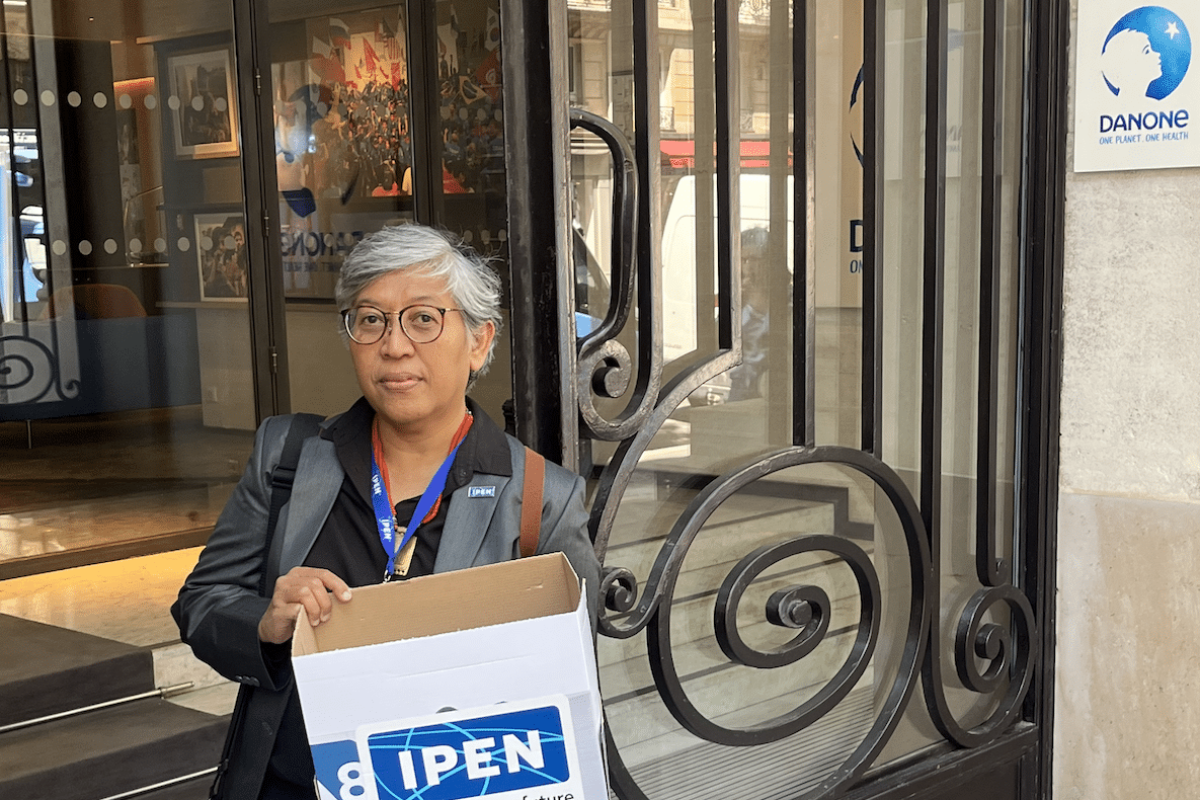
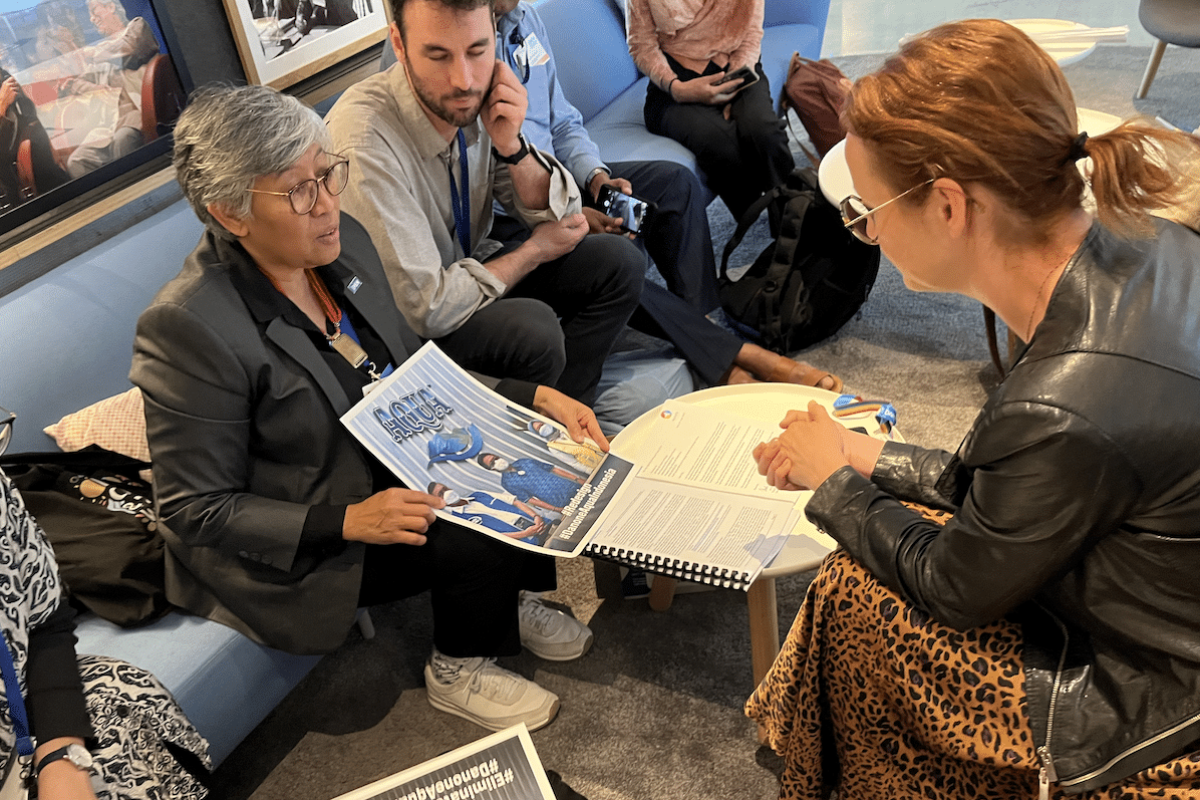
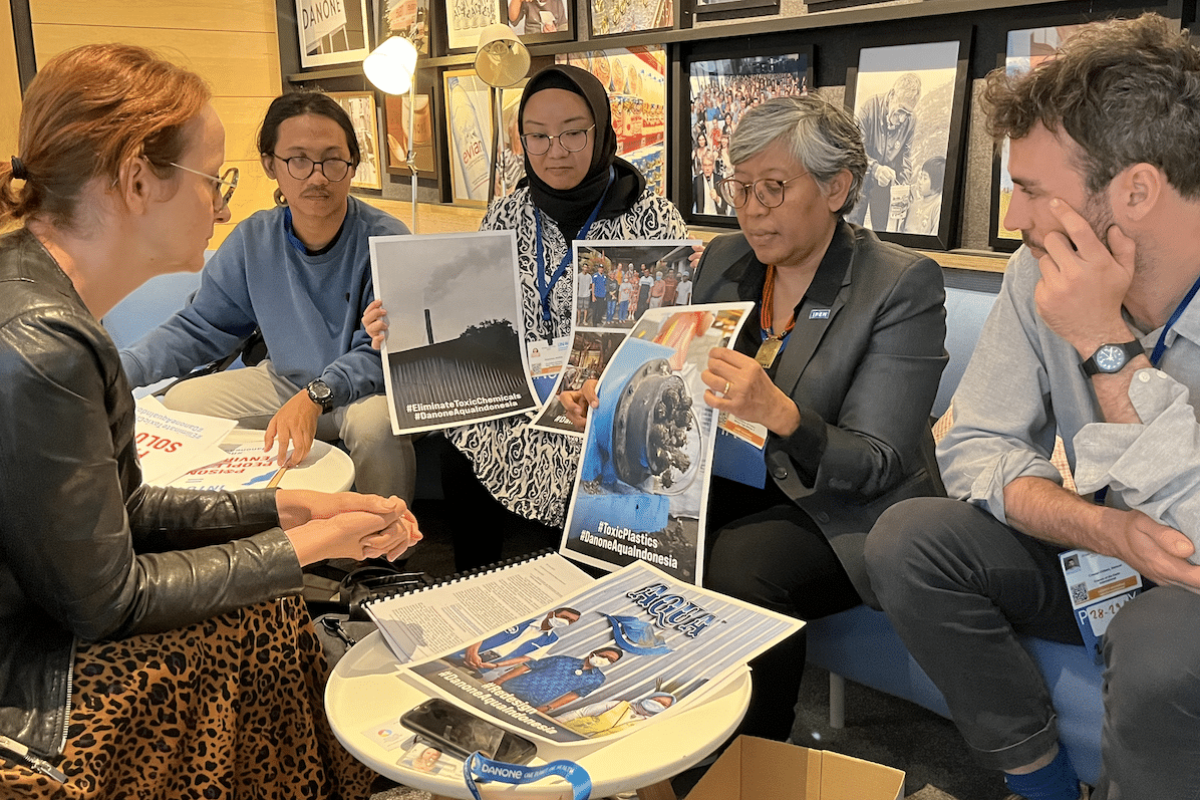
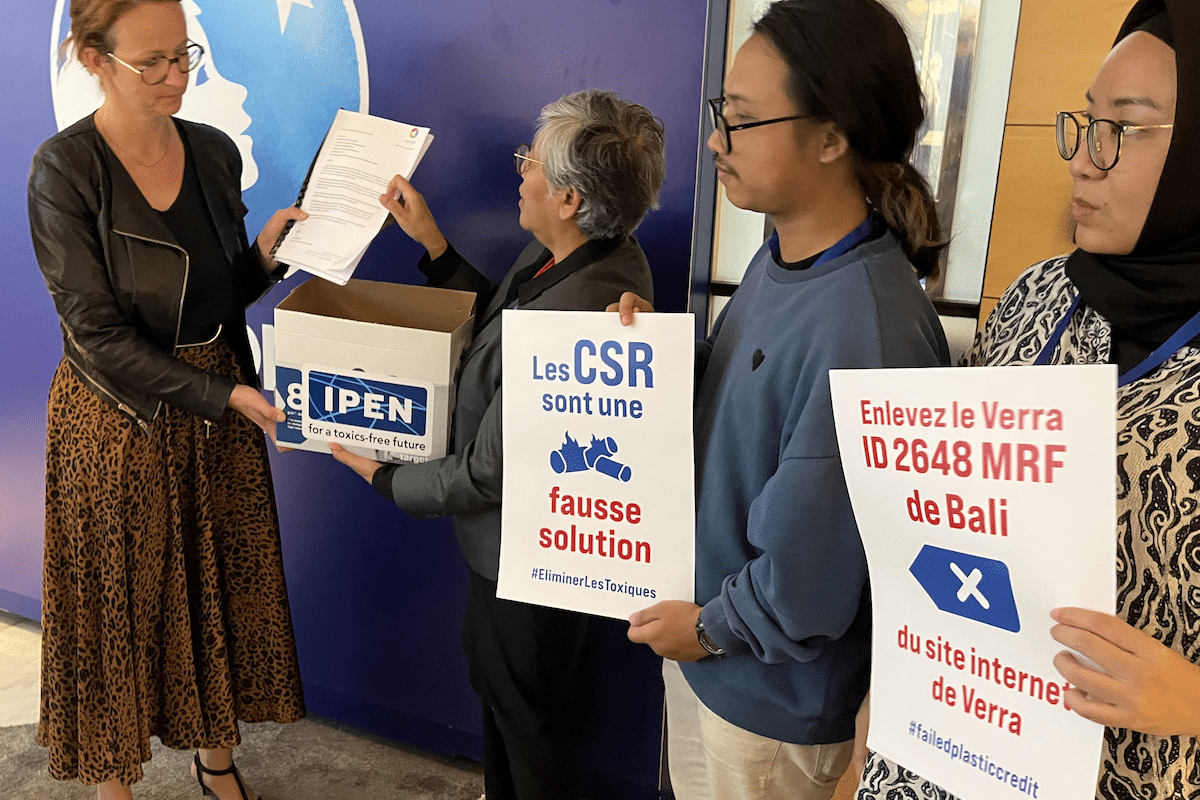
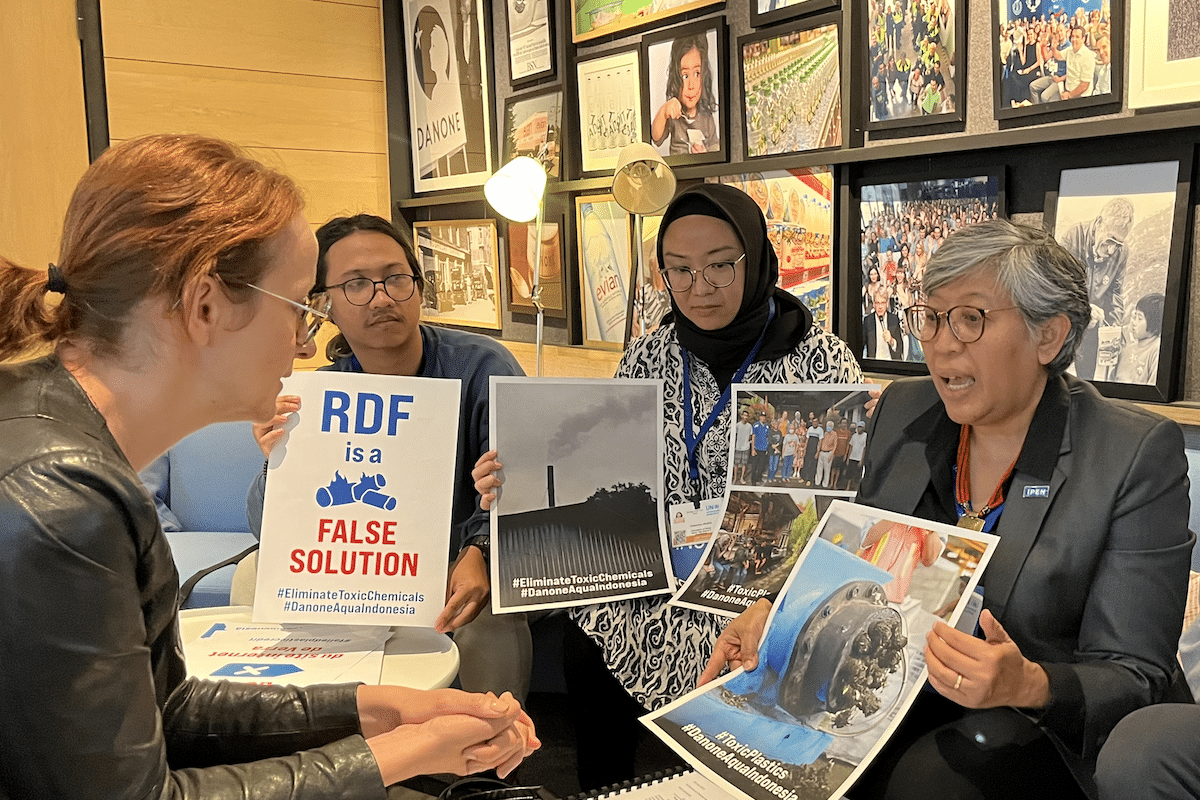
Since September 2021, the TPST Samtaku Jimbaran facility has managed 70-120 tons of unsorted household waste daily. More than 60% of the waste is organic waste, and when not contained immediately, organic waste decomposes and produces foul odors. The facility’s remaining 40% of waste is plastics and other garbage. In this facility, the residual waste and low-value plastics are converted into products that can be used as fuels (called RDF for Refuse-Derived Fuels), a process that leads to more toxic pollution when plastic fuels are burned.
Danone-Aqua Indonesia has registered the Material Recovery Facility (MRF) to claim plastic credits from Verra (Verra ID 2648) for 15,842 tons of plastics recovered in the facility. The plastic credit claims include RDF briquettes containing toxic cocktails that will be sold by the operator to laundry and food stalls for barbecues and laundry boilers. Such open burning of plastic produces highly toxic emissions with few or no controls.
To make RDF briquette, the low-value plastics are melted in high-temperature machines that release black smoke and leave filthy acidic smells that last for weeks. Hundreds of households have suffered from toxic, polluted air, and some residents have severe illnesses and have experienced multiple hospital visits.
“Today, my letter to Danone is being delivered to the company’s headquarters in Paris. I have written to Danone on behalf of the people of Angga Swara in Jimbaran Bali because they built a Material Recovery Facility in our neighborhood. For 20 months, we have suffered from its pollution. Danone’s facility infringes on our rights to a clean environment and blights our neighborhood. We have complained repeatedly, but now we insist on a response,” said Owen Podger, an Angga Swara community representative. “We call Danone to close the facility, immediately and permanently. It should never have been built. We hope the good investors in Danone will support us.”
“As one of the global players, Danone should respect the regulations in the country where they are doing business. Ignoring the obligations to develop a proper environmental impact assessment study and poisoning the community to benefit Danone’s business practice is unethical,” said Yuyun Ismawati from the Nexus3 Foundation and the Alliance for Zero Waste Indonesia. “Danone should shut down the facility and announce it publicly as they announced the launching of the project, remove the project from Verra’s plastic credit, and clean up the site where the facility is located.”
“Plastics contain thousands of toxic chemicals that create health risks to humans and the environment. Heating and burning plastic wastes produces even more toxic chemicals and should not be considered an ethical corporate practice that provides environmental benefits,” said Therese Karlsson, PhD, IPEN’s Science and Technical Advisor. ”This situation shows the urgent need for reducing plastic production and eliminating toxic chemicals from plastics.”
“Plastic offsetting is a sham, and no company should engage in it. Plastic offsetting does not reduce plastic pollution or address how much plastic a company produces. By setting up plastic offsetting schemes such as this one in Bali, Danone is greenwashing its image and avoiding making real, substantive changes in the amount of single-use plastic it uses. Not only that, but they are also actively harming the local community, stated Emma Priestland, Corporate Campaign Coordinator of BreakFreeFromPlastic.
In a resolute call to action, the Angga Swara community in Bali demands that Danone immediately and permanently close their toxic plastic facility, TPST Samtaku Jimbaran.
They assert that the facility infringes on their right to a clean environment and has caused severe health issues within the community. The community calls on Danone to respect ethical practices, remove the project from Verra’s plastic credits scheme, and thoroughly remediate the site.
Supporting Organizations
Nexus3 Foundation for Environmental, Health, and Development or Nexus3 Foundation (formerly known as BaliFokus Foundation) works to protect the public, especially vulnerable populations, from the impact of development on people’s health and environment. Nexus3 is working towards a future that is just, toxics-free, and sustainable. www.nexus3foundation.org
International Pollutants Elimination Network (IPEN) is a global network forging a healthier world where people and the environment are no longer harmed by the production, use, and disposal of toxic chemicals. Over 600 public interest NGOs in more than 120 countries, largely low- and middle-income nations, comprise IPEN and work to strengthen global and national chemicals and waste policies, contribute to ground-breaking research, and build a global movement for a toxics-free future. https://ipen.org/
Alliance for Zero Waste Indonesia (AZWI) campaigns for the genuine implementation of the Zero Waste concept in order to mainstream various existing Zero Waste activities, programs and initiatives to be implemented in various cities and regencies in Indonesia by taking into account the waste management hierarchy, material life cycle and circular economy. https://aliansizerowaste.id
#breakfreefromplastic (BFFP) is a global movement envisioning a future free from plastic pollution. Since its launch in 2016, more than 2,500 organizations representing millions of supporters around the world have joined the movement to demand massive reductions in single-use plastics and push for lasting solutions to the plastic pollution crisis. BFFP member organizations and individuals share the shared values of environmental protection and social justice and work together through a holistic approach to bring about systemic change. This means tackling plastic pollution across the whole plastics value chain—from extraction to disposal—focusing on prevention rather than cure and providing effective solutions. www.breakfreefromplastic.org
